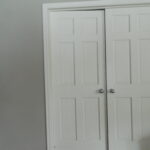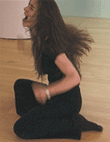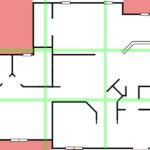STAIRCASE FENGSHUI
In case of a big foyer with a staircase further from the door, the energy can settle in and nourish the space, gradually and harmoniously finding its way to other areas of the house. When the foyer is small, though, and the staircase is facing the main door directly, the energy takes a rushed and fragmented quality, being forced to quickly rush up or down the stairs.
The feng shui cures in these cases are focused on creating a feng shui decorating style at the main door that will slow down the energy, focus it and then guide it to all areas of the main floor. This can be achieved with strategically placed art, specific colors, a big plant or a vase of flowers, specific pieces of furniture or mirrors (please note that mirrors should never face the entrance directly, as this pushes the energy away instead of drawing it in.
http://fengshui.about.com/od/faq/f/fs_staircase.htm
The position of the stairways and the type of stairways is also important according to Feng Shui. A stairway that is placed in the wrong place can deflect Chi in the wrong direction. If there is a stairway right opposite the front door, then on entering the house Chi will rush through and upstairs and the ground floor will be starved for Chi. Using mirrors, wind chimes, potted plants and screens on the stairs will slow down the rushing Chi.
If your stairway has risers instead of steps, it will hinder the flow of Chi to the second floor. Placing plants underneath the stairs will deflect Chi to the second floor allowing the energy to flow continuously. Making a skylight above the stairs will also improve the situation. Curved stairways are best, if you have a landing half way along the staircase it will help to calm the Chi as it rises and falls. If your stairway has sharp bends use mirrors, plants or wind chimes to remedy the situation. You can place a heavy statue on the floor at the base of the stairs to stabilize the situation. A spiral stairway is not good as it confuses the Chi as it moves along the staircase. Too many stairs will cause the Chi to fluctuate. According to traditional Feng Shui the number of stairs on a stairway should be an odd number. Stairs should be solid and there should be no opening at the back of each stair as it allows Chi to escape and it will not move to the second floor.
Stairs should be kept clean and should be well lit. As Chi gains speed as it moves over a staircase it is advisable to sleep near the top or bottom of the staircase. A bedroom should not face the staircase and should not be located too close to it. Do not clutter the space under the staircase. Arrange things in an orderly fashion or install a cupboard so that you can keep things tidily in it. Staircase running through the center of the house will cause conflict in the family. http://www.indobase.com/fengshui/tips-for-homes/stairways.html Feng shui rules for stairways and the effect they have on you
Rule No. 1: No open risers.
Stairs should be complete, whole stairs and always have risers (backing). Stairs with open risers lose flow and energy. Correct this by adding backs or risers to the stairs. This is especially problematic for home or apartments on the second floor. Effect: Second floor does not receive flow. Residents of second floor suffer.
Rule No. 2: Where stairs stop matters.
p>Stairs should not end at a door, such as the front door, or face a bedroom door. This creates poison arrows or killing chi (double that if a mirror reflects the staircase). If a staircase stops at a bedroom door, it can cause energy to drain away from the residents of the bedroom, causing financial and health-related problems related to low energy, such as low thyroid or depression. If your stairway terminates at the front door (like the picture at right), keep a bright light lit at the front door or in the foyer where the stairs are. This door should also have a covering over the glass to stop energy from running out of the house. Or, you can hang a crystal between the stairs and the front door. And if that doesn’t work for you, you can hang a small mirror at the back of the door to reflect the energy back up the stairs. These are all good and effective ways to combat this difficult placement.
Effect: Loss of wealth, neck and head problems. Difficulties with opportunities for head of household.
Rule No. 3: Staircase shape matters.
Curved staircases are best. Spiral staircases, resembling corkscrews boring into a house, are the worst. They become even worse if they are placed in the center of the house or by the front door. Effect: Problems occur in the location of the staircase, i.e., staircase in center creates loss of wealth, and problems for all residents. Staircase in health sector creates problems for health.
Rule No. 4: Split or scissor-style staircases create loss
Success in a household with a scissor staircase is elusive. This is doubled when a scissor staircase faces the front door (often seen in split level homes). Correct this by blocking the view of the staircase. Or wind a long strand of ivy (real or artificial) around the handrail from the upper stair to the lower stair. Place a plant at the top of the stairs or on the center of the stairs where it curves.
Effect: Scissor styles create loss for patriarch or breadwinner and relationships suffer. Opportunities are lost.
Rule No. 5: Staircase location is important.
Staircases located on the side of the home rather than in the center are preferable. Stairs at the center of the home can cause a rift or split in the family. Block the view to this stair case if possible to reduce its effect. Effect: When the staircase in the center of the house there can be a loss of wealth and problems for all residents. If the staircase is at the front it can cause a loss of opportunities, difficulties, energy running away. If the staircase terminates at the front door, it can cause neck stiffness.
More fine points on stairs: Below are a few more stairway considerations. Staircase coverings: Red carpets should never adorn staircases as they resemble blood flowing down. Carpet, wood, or tile are all fine coverings, with wood being the preferred as it offers growing energy that rises. Staircase foundations: If your staircase has space underneath it, refrain from placing water there, such as fountains, ponds, aquariums, etc. These can harm children. Ideally, there is a storage room under the stairs. It is good feng shui to use the space under a staircase for storage rather than to leave it empty. If the space is open underneath your stairs, you can place a home altar there.
If you use it as a storeroom, consider placing money boxes, wealth vases, or work-related items there. For instance, Lillian Too wrote that she used her stairway closet as a storage room for her books once she began writing and she’s the most published author in feng shui. She also lines her stairs with bookcases that feature, (what else?), her books. At our house, we have luggage stored under the stairs and have we ever traveled since moving into this house!
Bathrooms under staircases: Bathrooms located here, and particularly those in the center of the home, drain away even more precious energy and hurt all the residents of the home, not just the children. They also drain wealth away. Stairway landings: It’s best if stairs proceed up the wall without a landing in the middle or other type of break. If there is a break, consider lighting the steps or wall of the stairs to create good energy and help the chi move up and down the stairs.
Windows on stairways: If your stairs point toward a window or end at a window, you’re probably losing energy. Block this window by installing a shutter that can be closed so that the chi does not run out the window
Stairway Feng Shui Rules — Types of Stairs & How They Affect Your Feng Shui
Staircases are conduits of chi in the home. They are where chi moves from one level of the home to the next level. When your staircase has good feng shui, it distributes good fortune to the rest of home. However, when it is bad from a feng shui perspective, it spreads harmful energy causing illness, robbery and misfortune.
General Ground Rules
• Stairs should not have hollows or openings in the steps. These suggest “leakages”, making it difficult for residents to amass wealth.
• The staircase should be well lit and landings should have uplights.
• The top and bottom of staircases should never face the main door.
• The staircase must be solid. Avoid creaky or badly fitted banisters.
• Avoid carpeting your stairs with the color red, as this brings severe misfortune.
Avoid water under the stairs, as this hurts the success potential of the second generation of the family.
• Avoid locating the staircase in the center of the home.
• Stairs should never start or end in front of a toilet.
• Try to locate your stairs in sectors that correspond to inauspicious Flying Stars, as staircases can press down on bad luck caused by inauspicious stars.
• Avoid a spiral staircase, as this resembles a corkscrew. These are more harmful when located in the middle of the home.
Use Pyra strips on wall or ceiling around these stairs for protection and to balance the energy
Staircase Protection
• Install a crystal chandelier just before the start of the staircase.
• Place a screen or divider between your stairs and main door if they happen to be aligned with each other.
• Stairs can be made of wood, metal or concrete to simulate these three solid elements. Wooden stairs are suitable in the South, East and Southeast. Metal stairs are best in the North and concrete stairs work best in the Southwest, West and Northwest.
• Hang a picture of a protector image such as Chung Kwei or Kuan Kung near your stairs to create protective chi there.
• Place a pair of Fu Dogs either side of the stairs to protect against bad energy going upstairs and to encourage good luck chi to travel upwards.
http://www.wofs.com/index.php?option=com_content&Itemid=50&task=view&id=422
Compiled by Zara 05/24/2011






